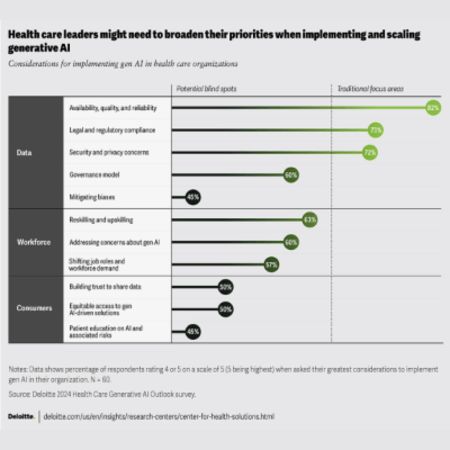Generative artificial intelligence (gen AI) is sparking excitement across various sectors, including healthcare. With its potential to enhance efficiency, effectiveness, and innovation, many healthcare organisations are gearing up to boost their AI investments this year. Moreover, consumers are increasingly open to engaging with Gen AI throughout their healthcare journeys.
Unveiling Oversight Gaps: Blind Spots in Gen AI Implementation
However, a recent survey by Deloitte highlights potential blind spots in healthcare executives' approach to implementing Gen AI. While data considerations like availability, quality, compliance, security, and privacy are highly prioritised, other crucial aspects might be overlooked. These blind spots include the lack of emphasis on effective governance, consumer trust-building, and addressing workforce needs.
Building Foundations: The Imperative of Effective Governance in Gen AI
Effective governance, including data governance and bias mitigation, is crucial for ensuring data quality, privacy, and consumer trust. Yet, only a minority of executives are focusing on these areas. Similarly, building consumer trust, improving data sharing, and educating patients about AI are deemed less important, despite their significance in fostering engagement and transparency.
Workforce Readiness: A Critical Component in Gen AI Adoption
Investing in workforce upskilling and addressing employees' concerns about AI's impact on their roles are also overlooked. This is concerning given the potential for AI to augment rather than replace human workers. Failure to address these workforce considerations may hinder successful Gen AI implementation.
Seizing the Promise: gearing up towards widespread adoption and efficiency
Despite its transformative potential, generative AI adoption may face challenges similar to past technological innovations like personal computers and the internet. To avoid a slow ramp-up, healthcare organisations must focus on multiple factors, including effective governance, consumer engagement, workforce buy-in, and scalability. Establishing effective governance structures, such as centre of excellence models, can facilitate interdisciplinary collaboration, innovation, and adherence to regulations. Moreover, prioritising consumer engagement and transparency is essential for building trust and demonstrating the value of Gen AI in healthcare. Addressing workforce concerns and integrating Gen AI as a workforce ally are crucial for overcoming resistance and maximizing its potential benefits. Finally, designing solutions with scalability in mind, leveraging robust machine learning operations capabilities, is essential for widespread adoption and efficiency.
Overall, gen AI holds immense promise for revolutionizing healthcare delivery, provided that healthcare organizations address data, consumer, and workforce considerations in a comprehensive and ethical manner. By prioritizing transparency, equity, and collaboration, healthcare can harness the full potential of gen AI to improve patient care and operational efficiencies while ensuring trust and fairness.
Source: Deloitte
Image Credit: Deloitte
























